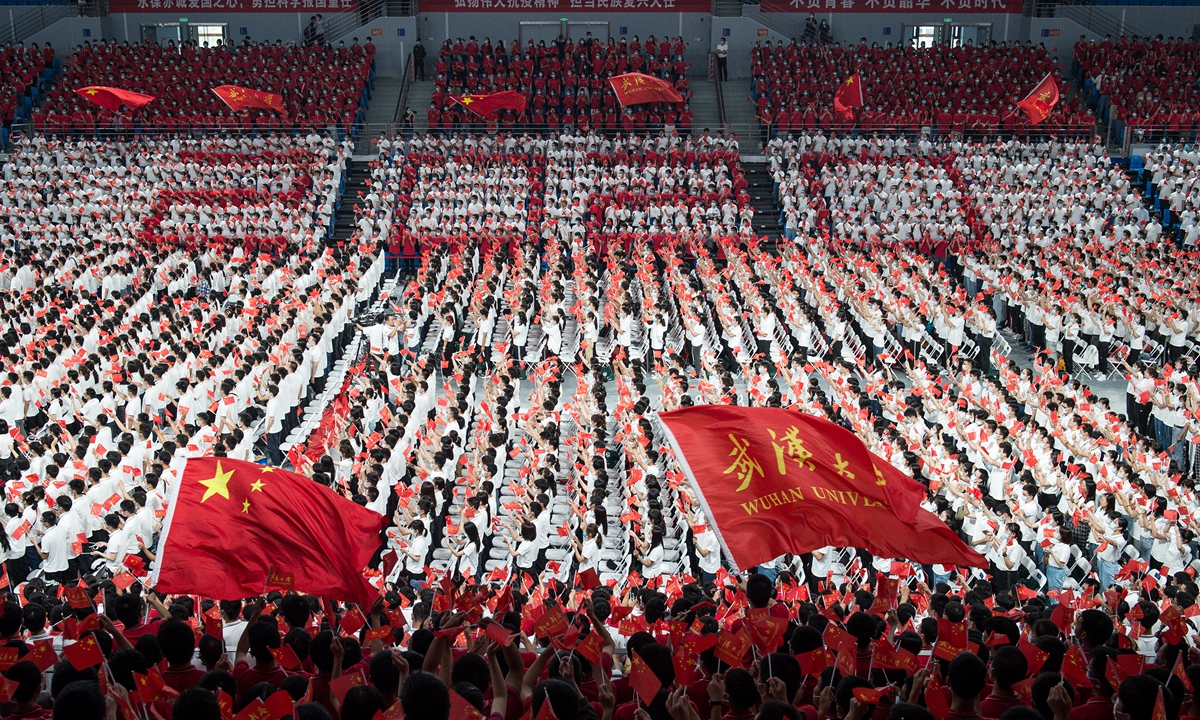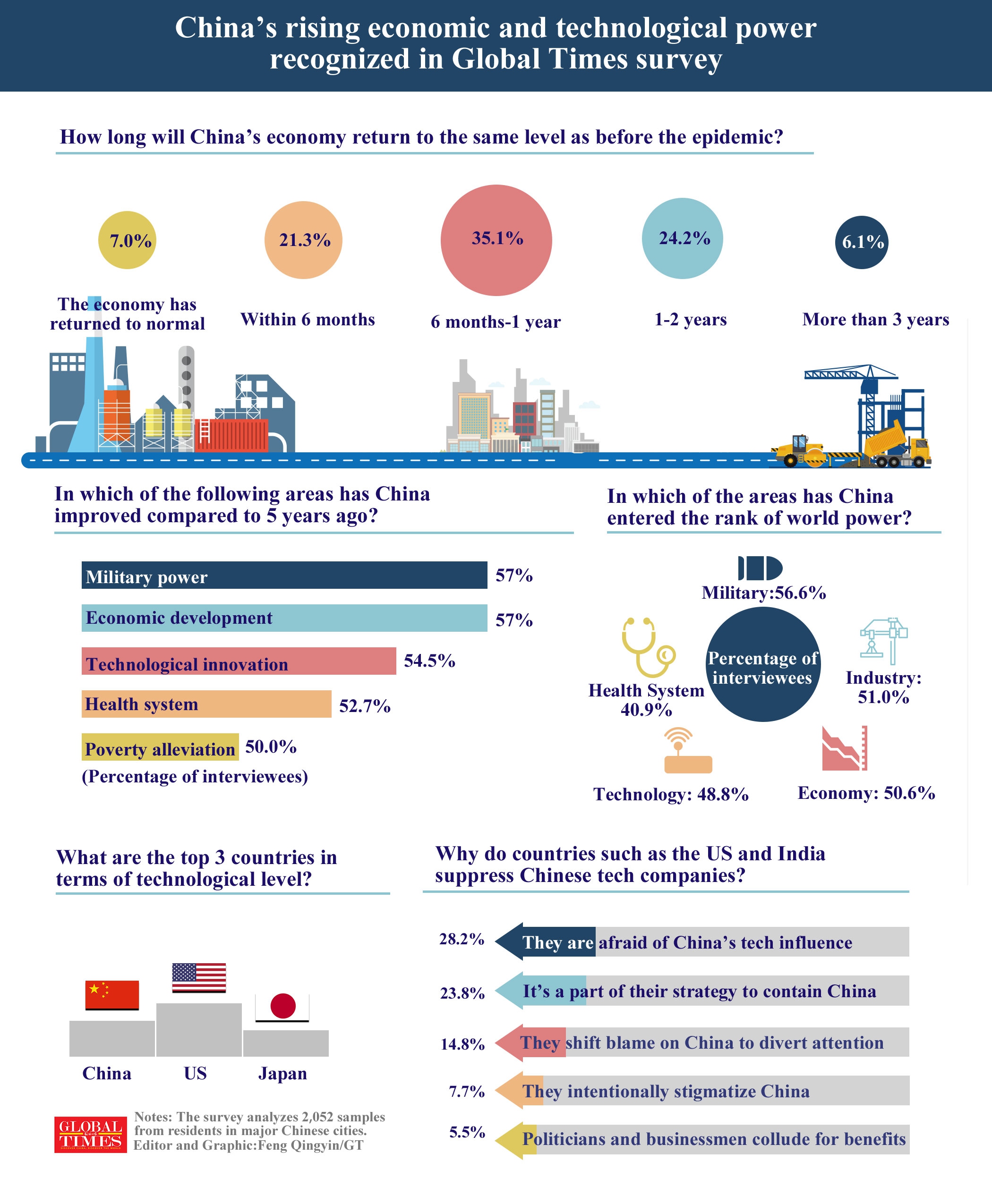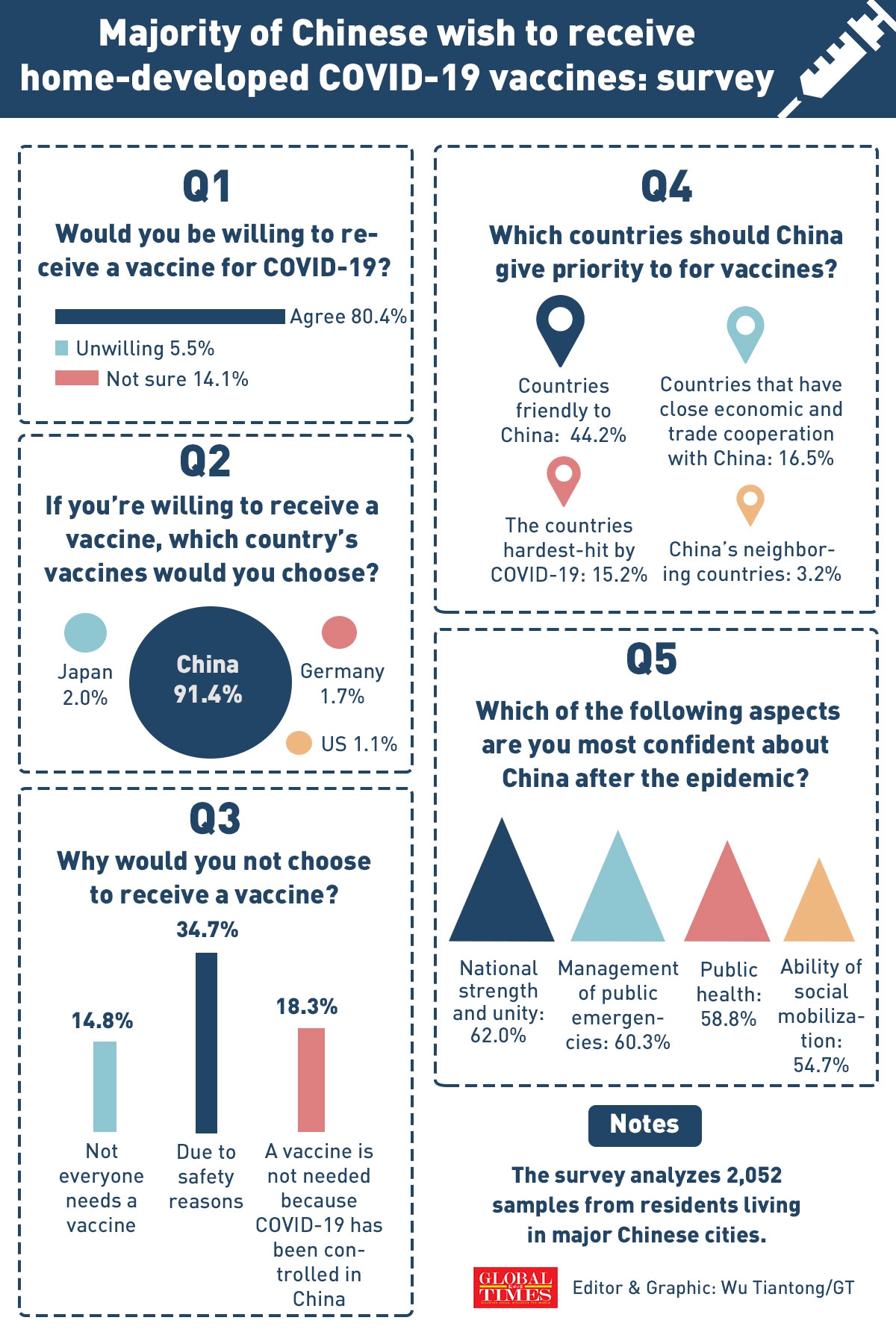Over 60 percent believe China will recover to pre-COVID19 status in a year: GT survey
By Chen Qingqing Source: Global Times Published: 2020/9/28 17:03:41 Last Updated: 2020/9/29 22:54:44
Coronavirus response boosts public confidence, national unity in China

A total of 7,242 freshmen attend the opening ceremony at Wuhan University, in Central China's Hubei Province on Saturday, nine months after the city was hit hard by the novel coronavirus. Photo: IC
More than 60 percent of respondents to the latest survey conducted by the Global Times believe that China's economy will recover to its pre-epidemic status within a year, and the country's all-out efforts to fight the coronavirus epidemic have lifted public confidence and strengthened national solidarity, according to the survey results.
The survey showed that China's military and economic achievements in the 13th Five-Year Plan (2016-20) period are the two most recognized developments, which observers consider as an indirect result of the US' reckless efforts to curb the rise of China.
About 63.4 percent of survey participants believe that China's economy will recover to its pre-epidemic status within one year, among which 21.3 percent said the economy may recover in just six months, according to the survey the Global Times Research Center conducted from September 18 to 21 of 2,052 respondents. The respondents were from 10 first- and second-tier cities such as Beijing, Shanghai, Guangzhou, capital of South China's Guangdong Province and Wuhan in Central China's Hubei Province and Kunming in Southwest China's Yunnan Province.
About 24.2 percent of the respondents believe it would take one to three years for China to recover to pre-epidemic levels, and 6.1 percent think it would take more than three years.

Confidence enhanced
"The prevailing optimistic view of the country's economic recovery post-COVID-19 partially originates from a comparison with foreign countries, and such strong confidence also stems from the effective containment of a possible resurgence of new outbreaks," Cao Heping, a professor of economics at Peking University in Beijing, told the Global Times on Sunday.
The accelerating economic recovery is also in line with expectations, the economist said, noting that the epidemic has not hurt the fundamentals of China's economy, with recent macroeconomic figures indicating faster recoveries in production, export and consumption.
The all-out people's fight against the COVID-19 outbreak also reinforced confidence in China's national strength and enhanced solidarity. The survey also showed that 62 percent of the respondents expressed greater confidence in China being strong and people being united, while 60.3 percent see their confidence lifted in the country's capability to handle public event emergencies.
Besides, 58.8 percent of the survey participants showed much more confidence in China's public health system and 54.7 percent of them recognize the improvement in the country's capability in social mobilization.
As the first country to report coronavirus cases, China took strict and effective measures to contain the viral spread with the efforts and solidarity of the whole nation. The country contained the epidemic within just a few months, and sporadic outbreaks in some places have not led to a resurgence of an epidemic.
However, in the US, with students back to school and businesses reopening, daily new cases are still continuing to increase, with its total death toll already surpassing 200,000.
"As long as China puts imported COVID-19 cases under control and with the vaccines being under way to put into use, the growing market demand will further drive up the economic recovery, which would exceed expectations," Cao said.
China is widely considered the silver lining in an overall grim picture of the world's economy engulfed in a pandemic. It has become the first major economy to return to growth in the wake of COVID-19 as its economy grew 3.2 percent year-on-year in the second quarter, reversing from a 6.8-percent contraction in the first quarter.
The World Bank projected on Monday that China's economy is expected to grow by 2.0 percent in 2020, up from the 1 percent growth projection released in June.
According to the latest report released by the UN Conference on Trade and Development (UNCTAD), the country is expected to grow by 1.3 percent this year before logging an 8.1 percent expansion in 2021, while the global economy would contract 4.3 percent.
While Chinese vaccine producers are accelerating clinical trials for COVID-19 vaccine candidates and preparing for full-speed production once a product is approved, 91.4 percent of the participants expressed their willingness to administer China-developed vaccines, according to the survey. Only 2 percent choose Japanese vaccines, 1.7 percent wish to take products made in Germany, while only 1.1 percent prefer vaccines from the US.
For those who do not intend to take a vaccine and who still hold a wait-and-see attitude, 34.7 percent of them have concerns about the safety of the vaccines. And 18.3 percent of them believe that the epidemic has been under control in China, which means there's no need to receive a dose.
Not only has Chinese traditional medicine been helping the fight against COVID-19, it has also become the most influential factor representing China, according to the survey.

Changing environment
Looking back on the 13th Five-Year Plan (2016-20), 57 percent of the survey participants believe that China has made the most significant progress in military strength and economic development compared to the situation five years ago. Also, 54.5 percent recognize China's technology and innovation, 52.7 percent approve of the country's medical standards, and 50 percent consider poverty alleviation as a highly recognized achievement.
When asked about which area China has become the world's most powerful country, 56.6 percent think it is the country's military strength, while 51 percent believe China has become a manufacturing powerhouse. Meanwhile, 50.6 percent recognize China's economic strength as a domain where the country is among the world leading powers.
"The survey results show that in the face of growing uncertainties, including US-led provocative moves in challenging China's sovereignty and core interests, China has no other choice but to continue enhancing its military power, which is defensive," Song Zhongping, a military expert and TV commentator, told the Global Times.
While Chinese people do not want to engage in a war, the tactics of the US in suppressing China as well as the situation involving the South China Sea, tensions in China-India border and the Taiwan Straits have forced China to strengthen the country's military capabilities, observers said.
Also, nearly half of the total respondents think China is a powerful country in the technology sector, and 40.9 percent of the respondents believe the country is advanced in medical care services.
When it comes to the ranking of technological levels of each country, 55.6 percent of the respondents consider the US the world's No.1 power. And 25.7 percent of the participants believe that China ranks the first. Over two-thirds (65.7 percent) of the respondents believe that China's overall technological level ranks among the world's top three, which is only behind the US (81.8 percent), and leads Japan (41.8 percent).
The latest crackdown on Chinese tech firms such as Huawei and TikTok by countries including the US and India made nearly 30 percent of the survey participants believe countries that suppress those firms do so because they are afraid of the rising influence of the Chinese technology, while 23.8 percent considered the crackdown as an extended move of the US' containment policy toward China.
Besides, 14.8 percent of the respondents saw such behavior as a way of "diverting public attention" from domestic problems to China-related issues.